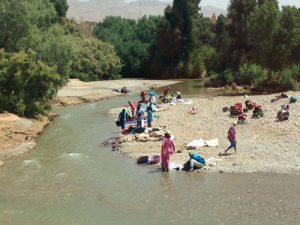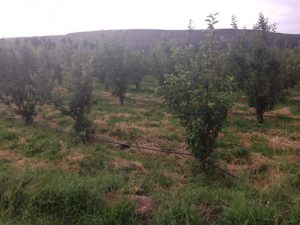
What I discovered…
I came to Morocco to research water usage. I wanted to tie in my studies and find possible intervention points to improve water management. In order to find intervention points, I have to understand the current situation. So this is what I discovered…
1. As a whole, in Morocco, water seems to be more of a public good. People go to public bathhouses called hammams about once every week. It is very basic. There are two pipes, hot and cold, with spickets that line the extent of the room. We were each given a bucket and claimed a spicket. We filled the bucket up as needed to shower and wash. I think I used 3 buckets total. I cannot even begin to imagine how many buckets one shower takes. In the more rural communities, people gather water from communal wells or from the river. Also, women take their laundry down to the riverbed to wash. I am not sure if they use soap, but if not, it is a lot more sustainable than our washing machines.
2. The Mansour Eddahbi reservoir was built to serve the Tassalmante and Ouarzazate region. Annual releases from the reservoir have allowed for survival and growth. However, the reservoir has not released the necessary amount of water in the past couple of years, which has led to scarcity and in turn poor water quality. This reminds me of the westward expansion in the states. Phoenix and Las Vegas exist because we were able to capture and control water. These regions boomed and now Lake Mead is strained because of droughts and overconsumption.
Teachers in the Tassalmante school educate students about ways to conserve water. One technique was to use no more than a cupful of water to brush teeth. The village of Ouarzazate has responded to the scarcity by using recycled water to irrigate landscape and agriculture. In Arizona we use reclaimed water to replenish our aquifers. In drought-ridden California, they use shame to decrease water use and have kicked up public service announcements to take shorter showers, install low flow faucets and switch to zeroscape.
3. While at Mohamed Akki’s organic apple orchard, we discussed his concern over water. He is aware of the importance and significance of water; without it, his sole livelihood would no longer exist. In order to use water more effectively, he handmade 10,000-15,000 meters of drip pipe for his apple orchard. In the states, there is a push to transition from traditional sprinklers to drip irrigation because it is more efficient.
4. I found that like Americans, the further away from the problem a person is, the less concerned they are about it. Urbanites were less concerned with water availability than the villagers close to the problem. People tend to react more to crises than to take precautionary, risk-averse measures. When I talked to city goers, they were more concerned with social issues than they were with environmental ones. Adversely, in the villages, it appeared people valued and conserved water more than their urbanite neighbors.




